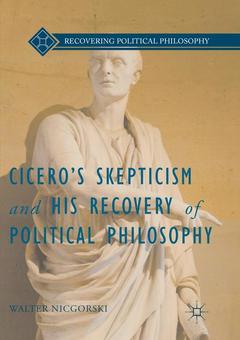Description
Cicero’s Skepticism and His Recovery of Political Philosophy, Softcover reprint of the original 1st ed. 2016
Recovering Political Philosophy Series
Language: English
Subject for Cicero’s Skepticism and His Recovery of Political...:
Keywords
SKEPTICISM; STOICISM; SOCRATES; PHILOSOPHY; SOCRATIC TURN; ARISTOTLE; EPICUREANISM
Publication date: 06-2018
Support: Print on demand
Support: Print on demand
Description
/li>Contents
/li>Biography
/li>
This book explores Cicero?s moral and political philosophy with great attention to his life and thought as a whole. The author ?thinks through? Cicero with a close reading of his most important philosophical writings. Nicgorski often resolves apparent tensions in Cicero?s thought that have posed obstacles to the appreciation of his practical philosophy. Some of the major tensions confronted are those between his Academic skepticism and apparent Stoicism, between his commitment to philosophy and to politics, rhetoric and oratory, and between his attachment to Greek philosophy and his profound engagement in Roman culture. Moreover, the key theme within Cicero?s writings is his intended recovery, within his Roman context, of both the Socratic focus on great questions of practical philosophy and Socratic skepticism. Cicero?s recovery of Socratic political philosophy in Roman garb is then the basis for recovery of Cicero as a notable political thinker relevant to ourtime and its problems.
Chapter 1 Skepticism, Politics and a Philosophical Foundation .- Chapter 2 The Critical and Rhetorical Modes of Philosophy .- Chapter 3 Duties and Virtue .- Chapter 4 Political Philosophy and the Roman Republic .- Chapter 5 The Socratic Statesman .- Epilogue .- References .- Index of Citations of Cicero.
Walter Nicgorski is Professor Emeritus at the University of Notre Dame, USA. He is editor of and contributor to Cicero’s Practical Philosophy (2012), co-editor and contributor to Leo Strauss: Political Philosopher and Jewish Thinker (1994) and An Almost Chosen People: The Moral Aspirations of Americans (1977). Key topics of his published essays are Cicero, liberal and character education, American political foundations, Leo Strauss, Allan Bloom, and Yves Simon.
© 2024 LAVOISIER S.A.S.

